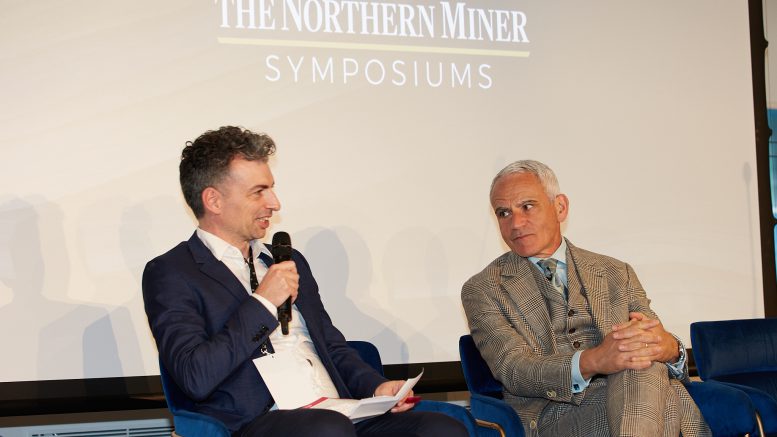Investors must back junior explorers to reverse the global trend of falling gold production while governments should give the industry leeway, Gold Royalty (NYSE: GROY) CEO David Garofalo says.
The Gold Royalty chairman and CEO, who is also co-chair of GoldMining (TSX: GOLD; NYSE: GLDG) sat down with The Northern Miner’s podcast host Adrian Pocobelli on Friday during the second day of TNM’s Canadian Mining Symposium in London.
In a wide-ranging conversation Garofalo shared insights from his more than 30 years of working in the industry. He analyzed issues including the exploration landscape, the role of government in mining and how better management of water can benefit the industry and the environment.

David Garofalo. Credit: The Northern Miner
Garofalo, who also led Goldcorp from 2016 to 2019, claims that gold reserves in the ground among major producers are down by 40% since 2012, leading to more consolidations and ultimately the industry eating itself.
“The industry just simply isn’t able to produce eight to 10 million oz. discoveries every year that each of those companies require,” he said. “They’re having to cannibalize it up, basically play Pacman, but it’s been a zero-sum game for the industry for a very long period of time.”
In the late 1990’s, Barrick Gold (TSX: ABX; NYSE: GOLD) and Newmont (NYSE: NEM; TSX: NGT) were struggling to maintain 5 to 6 million oz. of production, Garofalo said, and they’re still wrestling to attain what he called a suboptimal production rate.
Speaking about what the Canadian government can do to spur healthy exploration, Garofalo said bluntly that it should “stay out of the way.”
The long lead times for mine development, unclear regulations and overlapping government jurisdictions all drive away investment, he said.
Court ruling
Garofalo noted the Supreme Court of Canada ruled on Friday that the federal Impact Assessment Act is unconstitutional. The law, enacted in 2019 handles federal regulations on environmental and social impacts of natural resource projects.
“They said they really don’t have the jurisdiction to do what they’re doing at the federal level. It’s a provincial jurisdictional matter. Hallelujah,” Garafalo said. “I hope it actually takes hold and that we have a streamlined one level of government to deal with because it’s complex enough dealing with the multiple layers of social engagement.”
And juniors should be allowed to do what they do best: grassroots exploration, which he said he did while at Hudbay Minerals’ (TSX: HBM; NYSE: HBM) and at Goldcorp.
“We constantly rotated that capital and put it to work with juniors that had good stories in good districts where we thought we had tuck in potential. And that will allow the juniors to start to replenish the pool,” he said.
While he noted that the flow-through stock structure in Canada is effective at incentivizing grassroots exploration, it doesn’t work as well if there isn’t a sufficiently robust capital market .
Nationalism
His conversation with Pocobelli then segued into the resource nationalism associated with the response to Glencore’s (LSE: GLEN) US$8.2 billion offer for Teck Resources (TSX: TECK.A/TECK.B; NYSE: TECK) this year.
Garofalo simply responded that it’s an “argument of convenience to wrap yourself in the Canadian flag,” saying that companies will come and go in a country like Canada with such a strong mining industry.
“[It’s] like a very deeply rooted bush,” he said. “You trim the top off, it grows back, the roots are too deep. I can’t think of any other industry where we export talent, where the rest of the world looks for us for leadership.”
The Gold Royalty boss likewise shrugged at the alleged promise of technology as a paradigm-shift for mining, saying the only technological revolution he has seen in his tenure is heap leaching in the 1990s.
Crucial water
Instead, he holds more hope in smart water management for the sake of better mine development, communities and the environment.
Water-intensive mines, he said, can easily spark friction with rural communities especially ones where water is scarce. And tailings dam failures, while rare, are catastrophic for people, the environment and the industry’s image.
He recalled, after years in the industry when the concept of recycling water was taken less seriously, realizing the high social costs in neglecting the value of water, and launched the Zero Water initiative at Goldcorp.
“I figured if we measure it, we’ll manage it. We had less than 50% recycling. By the time I left, in 2019, we were up to about 80% recycling of our water,” he said.
That progress is encouraging, but the industry still isn’t where it needs to be, which is at 100% recycling of water, Garofalo said.
“We need to be seen as effective water stewards. I guarantee you that will pave the way to getting development up and running much more quickly, getting the permitting, getting the social licence to operate.”






Be the first to comment on "CMS: State should ‘stay out of the way,’ Garofalo says"